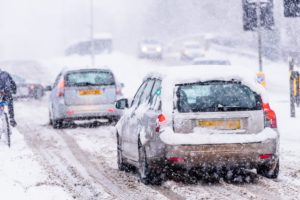Driving in Connecticut can be a treat for many motorists. However, when winter arrives, the dangerous driving conditions result in hundreds of car crashes. Connecticut’s Office of Legislative Research has tallied up to half a million car crash reports since 2016. Of this number, nearly a third were car accidents that occurred during winter.
The numbers prove one thing — winter driving in Connecticut can be dangerous. Nevertheless, these numbers should not stop you from getting behind the wheel.
An experienced Connecticut car accident lawyer can save you a lot of headaches if you get into a winter driving incident. They also know how to avoid these accidents from happening. Practice these seven winter driving tips to make winter driving safer.

1. Wear Your Seatbelt
Wearing your seatbelt is one of the most important things you can do to ensure your safety behind the wheel. Besides protecting you from flying towards the windshield, a seatbelt keeps you on your seat so that you do not suffer from a concussion. Concussions can occur after drivers hit their steering wheels or dashboards following an abrupt stop.
The other benefit of wearing a seatbelt is whiplash protection. According to the National Institute for Neurological Disorders and Stroke, whiplash is the result of damage to the soft tissues of the neck and spine.
The soft tissue damage occurs due to mechanical shearing forces of the head being thrust forward and back abruptly. A seatbelt keeps your body close to the seat, stabilizing your spine during impact.
2. Change Your Tires
The treads on your tires wear down over time as you drive your car. The less tread your tires have, the less traction they will provide your vehicle on slippery surfaces. During the winter, you can skid uncontrollably if your tires don’t have sufficient tread.
Changing your tires will minimize the chances of slipping when you turn or hit the brakes on ice and snow-covered roads. When you select new tires, ensure that they have a good tread pattern suitable for all weather conditions. If the budget allows, you can purchase a set of snow tires from your local automotive supply store.
3. As Much as Possible, Gradually Reduce Speed Instead of Slamming the Brakes
In situations where a sudden stop is not needed, it is better to reduce your speed gradually. The reason why braking during winter is discouraged is that cars slide after braking. When your car slides on an ice-covered road, you may collide with another vehicle, person, or building.
When planning to stop, you need to allow plenty of time to slow down first. When you need to stop suddenly, the next tip might save you from injuries and liability.
4. When Necessary, Pump the Breaks and Steer Your Vehicle Toward the Shoulder
Doing this prevents two things:
First, pumping the breaks simulates the function of anti-lock brakes, preventing your wheels from locking up and allowing you to maintain some control over your vehicle. You will be minimizing the chances of running into another vehicle, causing injuries, or being subject to a liability claim or lawsuit.
Second, by steering your vehicle toward the shoulder, you place it in an area that will not disrupt traffic. Your vehicle may still suffer some damages, but you will lessen the likelihood of creating additional accidents while you wait for help to arrive.
5. Drive Where the Streets Are Well-Lit
During the winter, visibility can be a major limiting factor for many drivers. The snow can blind many motorists, and this is when accidents occur. To prevent the same from happening to you, choose well-lit streets when driving at night.
Well-lit places are usually:
- National roads
- City roads
- Interstates
- Streets within or near a city center
Regardless of streetlight availability, ensure that your vehicle’s headlights are functional, well-adjusted, and clear of snow and ice. Always keep your lights at their brightest for safety and so that other drivers can see you on the road.
6. Avoid Using Cruise Control
Driver-assistive vehicles like Tesla’s Model 3 have advanced autopilot or cruise control functions that allow you to keep your hands off the wheel. Doing this may be fine on open roads and in clear weather. However, it is dangerous to trust in cruise control or autopilot during the winter.
Being on cruise control can lead you to fall asleep behind the wheel. Beyond the obvious consequences of this, you may be liable if your car crashes into another vehicle. In Connecticut, crashing into another vehicle or person will render the driver legally responsible for the incident.
7. Do not Drink and Drive
Drinking and driving when the roads are slippery can increase the chance of car collisions. According to Responsibility.org, DUIs have resulted in hundreds of fatal car accidents in Connecticut.
The slippery roads and reduced visibility brought about by winter conditions impair vision. As a driver, your visual acuity and reaction time can be hindered further under the influence of alcohol. It is better to have someone drive for you if you have been drinking, even if you do not feel intoxicated.
Do not Leave Car Accident Claims on Autopilot
Many accidents occur in the winter, and it is easy to see why. By following these seven tips, you will be going a mile further in keeping yourself safe. However, if you are in an accident, defending yourself from a lawsuit can be harder than stopping a skidding vehicle.
Leave nothing to chance with an experienced Connecticut car accident lawyer. Get behind the wheel of your car accident compensation case with Jonathan Perkins Injury Lawyers.
